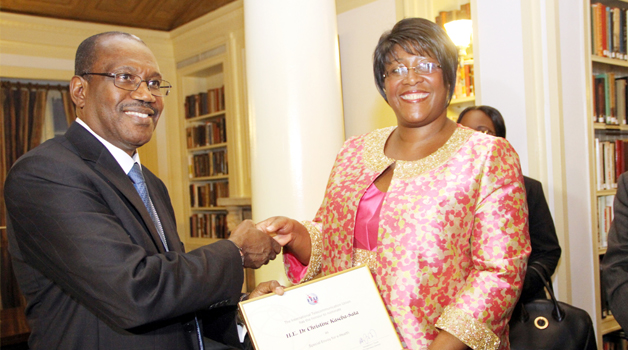
• First Lady Dr Christine Kaseba being inaugurated as a special envoy for e-Health by International Telecommunications Union secretary general Hamadoun Toure at Yale Club. This was on the sidelines of the 69th UN General Assembly in New York on Sunday. Picture by THOMAS NSAMA
FROM CHISHIMBA CHISHIMBA, In New York, USA –
FIRST Lady Christine Kaseba has been honoured as special envoy for the International Telecommunications Union (ITU) on e-health following her outstanding advocacy for health at regional and global levels.
Dr Kaseba received the honour at Yale Club during a colourful investiture ceremony attended by various international health and other partners on the sidelines of the United Nations (UN) General Assembly.
ITU secretary general Hamadoun Toure said as a special envoy of e-health, Dr Kaseba would contribute significantly to raising awareness of technology for health, particularly in low-resource-settings.
Dr Toure said for a long time, Dr Kaseba had been a powerful and vocal advocate for health at regional and global levels, hence his organisation’s decision to appoint her as special envoy of e-health.
He said the First Lady had a vision of how technology could accelerate achievement of health-related Millennium Development Goals (MDGs).
In accepting her appointment, Dr Kaseba said health was an indispensable asset that was universal to both the ‘haves’ and the ‘have nots’ and that the collective health of mankind was a basis for development of any society.
“ICT is a critical enabler of development and plays an important catalytic role in ensuring universal health,” Dr Kaseba said.
She said it was important to embrace modern information communication technology (ICT) in the health sector, as through this facility, the world was more connected than ever before.
Dr Kaseba said the ITU had been promoting the use of digital tools in enhancing access to healthcare in different parts of the world.
Zambia, she said, had been promoting the use of ICT in facilitating access to expert care to rural communities and that the Government had been installing communication towers, particularly in the rural areas.
Dr Kaseba pledged that as a special envoy, she would work tirelessly to serve communities on health-related matters, especially issues affecting women and children.
Meanwhile, Dr Kaseba has called on African countries to strike a balance between offering huge tracts of land to multinationals and maintaining reasonable portions to the locals for them to engage in sustainable food production.
The First Lady said here that Africans needed sufficient land for agricultural purposes so that the continent could have enough food and be able to ‘beat’ malnutrition.
Dr Kaseba was speaking during the EAT Third Advisory Board meeting hosted by the New York Academy of Sciences, which also had participants from other countries via e-forum.
“Really, it is important for Governments to strike a balance between giving land to conglomerates and also leaving some tracts to the locals because they (locals) depend on land for their livelihood,” she said.
Dr Kaseba said malnutrition was a real problem in Africa but that it could be resolved because the continent was able to produce food even for the world.
The First Lady, who participated in the elaborate meeting from morning to late afternoon, said she regarded issues of good nutrition as very important and that this could be promoted and sustained through agricultural production by the locals.
At the same function, EAT Advisory Board chairperson Professor Johan Rockstrom said it was important to ensure that there was a healthy and sustainable food system.
Prof Rockstrom, who is also executive director of Stockholm Resilience Centre, said a healthy and sustainable food system was a pre-requisite to human prosperity and development, hence the need for concerted efforts to ensure healthy living for all.
The meeting was taking place on the sidelines of the UN General Assembly where President Michael Sata is leading the Zambian delegation.






